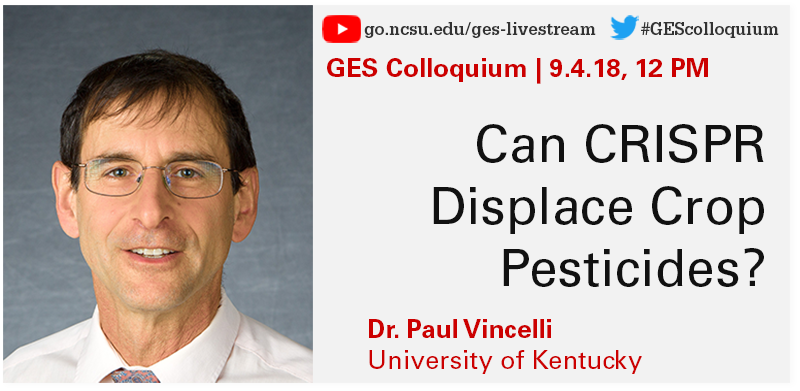
- This event has passed.
Paul Vincelli – ‘Can CRISPR Displace Crop Pesticides?’
September 4, 2018 @ 12:00 pm - 1:00 pm

GES Colloquium | YouTube: LIVE STREAM We are thrilled to welcome Paul Vincelli as our first invited speaker of the semester. Paul is an extension professor at the University of Kentucky in the department of Plant Pathology, as well as co-host of the Talking Biotech podcast! He will be available to have lunch and/or meet with folks during his visit on 9/4. Book meeting with Paul
DETAILS:
Speaker: Paul Vincelli, University of Kentucky (link) Recommended reading:
Abstract: Many farmers perceive benefits from pesticides (including herbicides, insecticides, fungicides, nematicides, and bactericides). However, legitimate concerns exist over pesticide residues in food and in the environment, and almost everyone is in favor of reducing pesticide use wherever possible. A remarkably wide range of traits can now be engineered in crops as a result of four trends: explosive growth in nucleic acid sequencing technologies; massive and rapidly expanding bioinformatic databases; increasingly sophisticated bioinformatic tools; and, most recently, the emergence of CRISPR and other gene-editing technologies. With 35 years of academic study of disease-control chemicals in diverse crops in diverse regions, I see present-day genetic technologies (most especially gene editing) as offering important opportunities to reduce pesticide use in our diverse farming systems. But under what circumstances might we expect such reductions? Can crop genetics for disease resistance be deployed sustainably? Who will be the beneficiaries of genetic traits that reduce pesticide dependence? And how can we assure that CRISPR-based applications for disease and insect control on the farm are consistent with broadly shared values? Bio: Paul Vincelli, Ph.D., is Extension Professor and Provost’s Distinguished Service Professor in the University of Kentucky’s Department of Plant Pathology, where he joined the faculty in 1990. He has responsibilities for a wide range of programs, including: • Management of diseases of turfgrasses and forest trees • Molecular diagnostics • Sustainability of food systems, including serving as Kentucky Co-Coordinator for the USDA’s Southern Region Sustainable Agriculture Research and Education (SARE) Program • International agriculture • Outreach on risks and benefits of genetically engineered crops • Teaching of several courses, including a two-semester, online, graduate course series entitled, Introduction to Genetically Engineered Crops, Risks and Benefits. — Register for Colloquium: GES 591-002 (optional, 1 credit) Colloquium contact: Dr. Jason Delborne, jadelbor@ncsu.edu | go.ncsu.edu/ges-colloquium